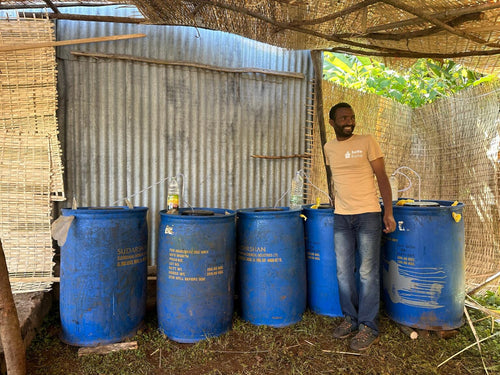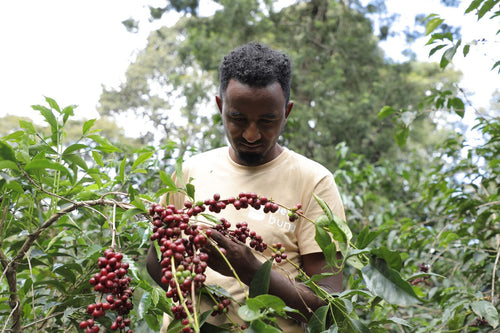Very proudly announcing: Our second round of decafs from our best friends at Bette Buna, and it's a truly special decaf for all you night owls out there. With a juicy, nuanced profile of soft berries, citrus, and toffee, it's incredible on its own or in a milky drink. This coffee is from our favourite Ethiopian coffee producers, Bette Buna, who not only grow exquisite coffee but also provide countless opportunities for people in their communities.
We decaffeinated this coffee with our friends at Falcon coffee, who did incredible work supporting Bette Buna this year. They took half of the coffee, and we took half to split the risk of doing a decaf run.
Betta Buna was founded by partners Hester Westerveld-Syoum and Dawit Syoum when they inherited their grandfather’s tiny family farm in Taferi Kela, Sidamo. With a background in NGO and development work, they decided to grow and scale the farm as the foundation for a larger company with greater impact. Coffee is a big deal in Ethiopia: More than 33% of the country's GDP comes from the export of coffee and 80% of that production comes from smallholder farms under 2 hectares, even as 90% of people working in coffee in Ethiopia don’t make a livable income. Bette Buna was formed to meet the obvious need to improve outcomes for smallholders and to generate opportunities for farming communities along the way.
Having started in 2019, they have already grown considerably. They have expanded the Taferi Kela farm from 2 to 50 hectares and have spread to a second 50-hectare farm in Megadu, Guji, where this lot was grown. Both farms have tree nurseries where varietals are grown for their own use as well as to share with surrounding farmers. Similarly, they have facilities where they process their own lots and educate other farmers in processing techniques while their ‘Coffee Campus’ programme provides training in roasting, brewing, and even exporting. Essentially, they invest in their farming communities not only by teaching and motivating farmers but also by hiring local workers at their nurseries and mills, including single mothers and disabled people who would struggle to find employment elsewhere. They also work hard to incorporate sustainable farming methods, rewild forests on their land, and protect local wildlife to promote ecosystem health for coming generations.
We’re such big fans that we sent Micah and Tabitha to help and learn from them for a couple weeks this January. You can read more about their experience in a recent blog post here.
To process this lot, cherries were fully washed, then sun-dried on raised beds for 3.5 weeks to naturally enhance their complexity and sweetness. They were then decaffeinated using the Ethyl Acetate process, a natural and environmentally friendly decaffeination technique. To achieve this technique, green coffee beans are steamed to open their pores, making it easier for caffeine to be extracted. The beans are then washed with ethyl acetate, a naturally occuring compound found in fruit, which selectively binds to caffeine molecules. Ethyl acetate is able to dissolve caffeine without significantly affecting the flavor compounds in the coffee. After the caffeine has been removed, the beans are steamed again to remove any residual ethyl acetate. Finally, the coffee is dried and prepared for roasting.
Above: Sisay Tadesse and Hester Westerveld-Syoum
Below left: Sisay Tadesse standing next to anaerobic fermentation barrels
Below right: Dawit Syoum harvesting ripe coffee cherries
Elevation: 1,998-2,200 MASL
Varietal: Enat Buna & 74412
Cup score: 85.5
Price paid per kg: £10.30
Process: Washed and EA Decaf

